外研版(2019)必修第三册 Unit 6 Disaster and hope Using language名师课件(共25张PPT)
文档属性
| 名称 | 外研版(2019)必修第三册 Unit 6 Disaster and hope Using language名师课件(共25张PPT) | 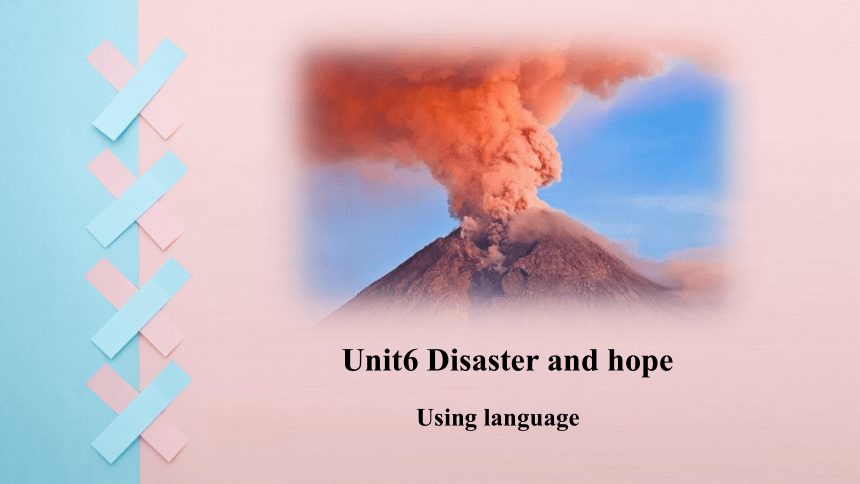 | |
| 格式 | pptx | ||
| 文件大小 | 4.1MB | ||
| 资源类型 | 教案 | ||
| 版本资源 | 外研版(2019) | ||
| 科目 | 英语 | ||
| 更新时间 | 2023-03-02 07:34:45 | ||
图片预览

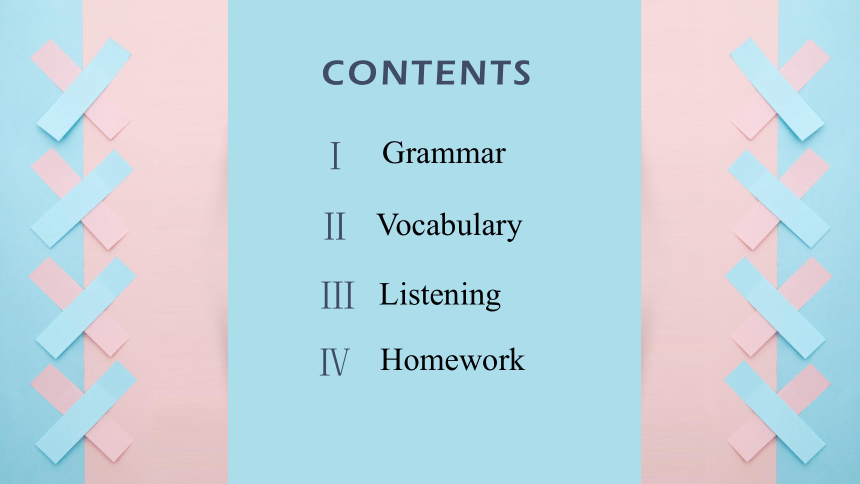

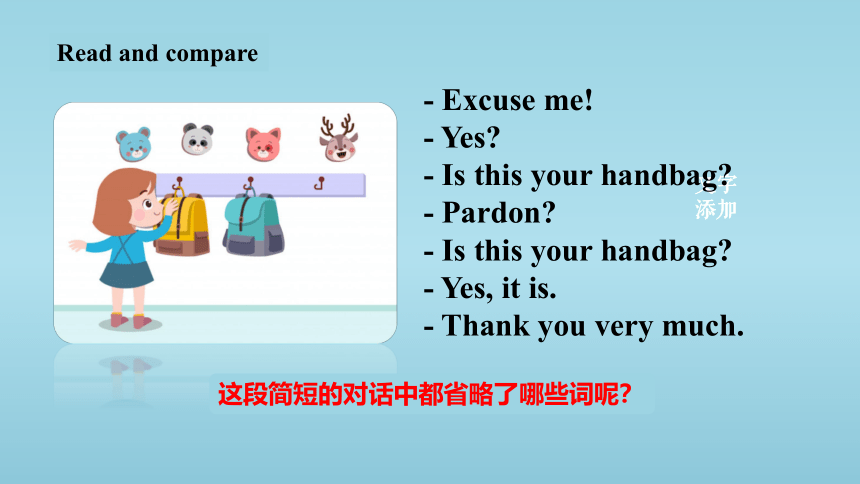
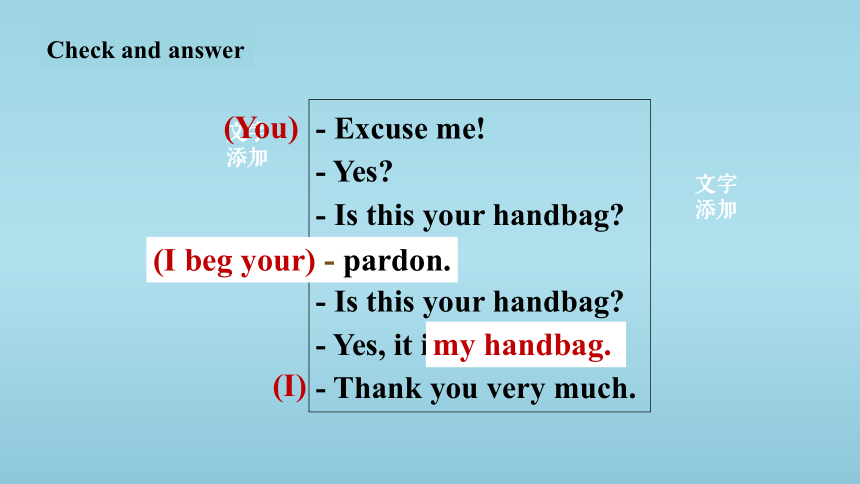
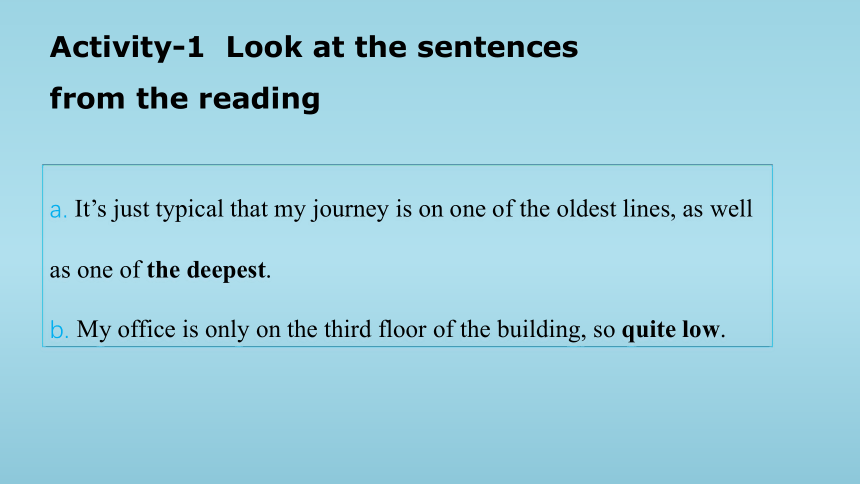
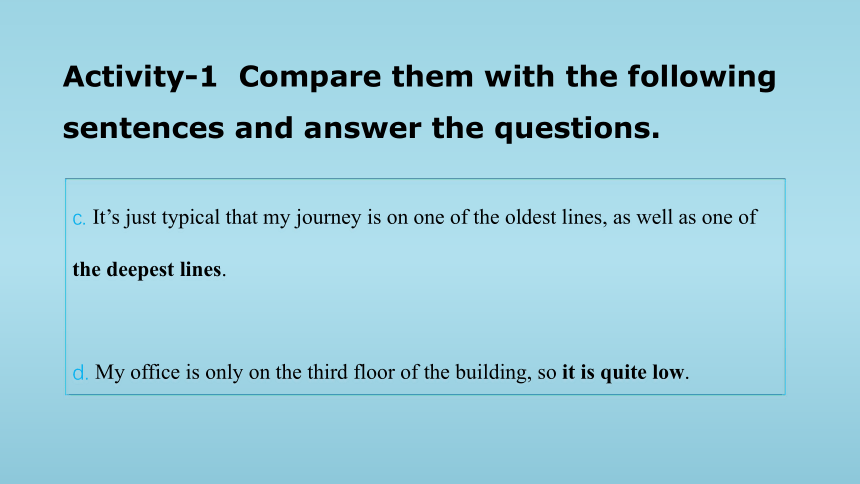
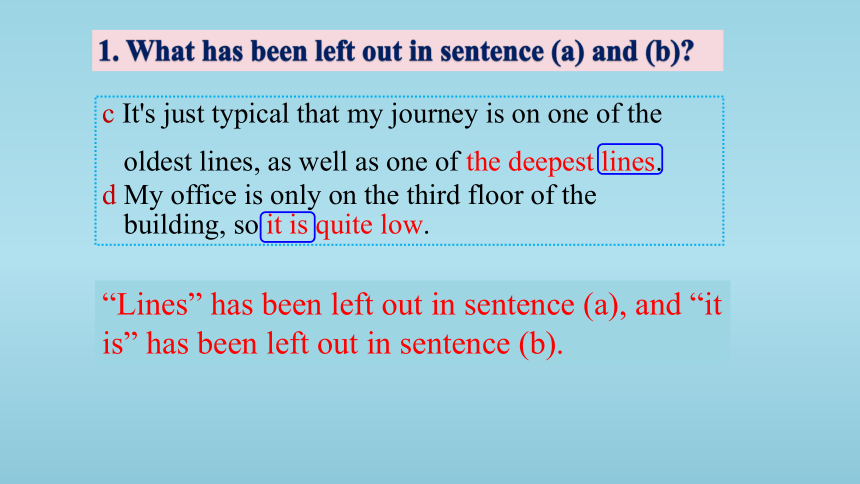
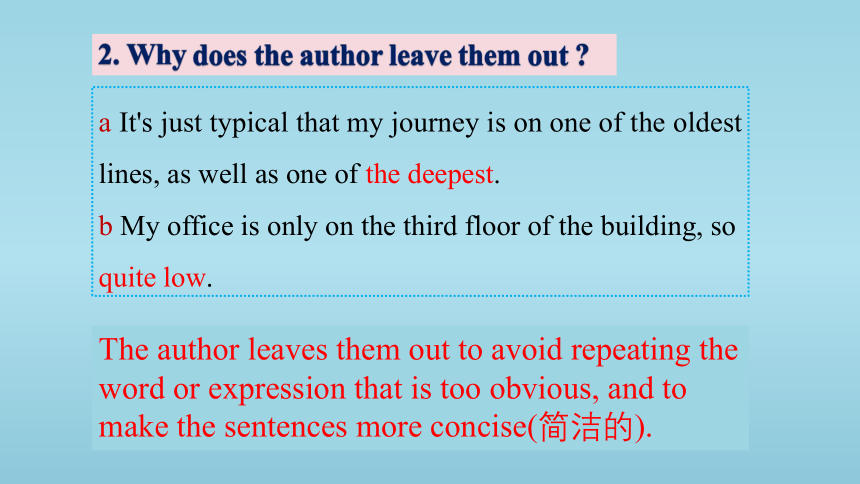
文档简介
(共25张PPT)
Unit6 Disaster and hope
Using language
Ⅰ
Ⅱ
Ⅲ
CONTENTS
Grammar
Listening
Vocabulary
Ⅳ
Homework
Grammar
Part 1
文字
添加
文字
添加
Read and compare
- Excuse me!
- Yes
- Is this your handbag
- Pardon
- Is this your handbag
- Yes, it is.
- Thank you very much.
这段简短的对话中都省略了哪些词呢?
文字
添加
文字
添加
- Excuse me!
- Yes
- Is this your handbag
Pardon
- Is this your handbag
- Yes, it is.
- Thank you very much.
(You)
(I beg your) - pardon.
my handbag.
(I)
Check and answer
Activity-1 Look at the sentences from the reading
a. It’s just typical that my journey is on one of the oldest lines, as well as one of the deepest.
b. My office is only on the third floor of the building, so quite low.
c. It’s just typical that my journey is on one of the oldest lines, as well as one of the deepest lines.
d. My office is only on the third floor of the building, so it is quite low.
Activity-1 Compare them with the following sentences and answer the questions.
1. What has been left out in sentence (a) and (b)
“Lines” has been left out in sentence (a), and “it is” has been left out in sentence (b).
c It's just typical that my journey is on one of the
oldest lines, as well as one of the deepest lines.
d My office is only on the third floor of the
building, so it is quite low.
2. Why does the author leave them out
a It's just typical that my journey is on one of the oldest lines, as well as one of the deepest.
b My office is only on the third floor of the building, so quite low.
The author leaves them out to avoid repeating the word or expression that is too obvious, and to make the sentences more concise(简洁的).
(1) He majors in English, and I in French.
Major
(2) We tried to persuade her. but in vain.
we tried
(3) l asked him to see the film, but he didn't want to.
see the film
Find the ellipsis
Look for more sentences with ellipsis in the reading passage
(1) It’s the hottest on the whole Tube system.
line
(2) This, however, is nothing compared to the train.
the temperature inside
(3) It's lovely at the beach, but not so when you're wearing a suit and in a crowd of passengers!
lovely
(4) Yes, each summer in London definitely seems hotter than the last.
summer
Read the paragraph in Activity 2 and answer the two questions.
1. What are animals are mentioned
Fish, frogs, birds, mice, snakes, and dogs.
2. What is best to do for accurate and reliable predictions
It’s best to look an official scientific report.
Activity 2
Find out what words have been removed before or after the underlined words.
its ways (to forecast the weather)
dry period (that’s on the way)
more loudly (than usual)
(look) for birds
when and where (something bad is going to happen)
Activity 3: Remove words from the news report to make it more concise
The 8.1 magnitude earthquake that hit Nepal on 25 April 2015, was one of the worst earthquakes in history. On hearing the news, China was quick to start organising emergency aid.
International rescue teams soon began to arrive in the country. Amongst all the international heavy rescue teams, the China International Search and Rescue Team(CISAR) was the first international heavy rescue team to arrive. Consisting of 62 people, it not only included rescuers and medical staff, but also included earthquake experts. By early May, emergency aid worth 9.7 million US dollars had been donated by China, with a further round of emergency aid to follow.
Vocabulary
Part 2
Types of natural disasters
Activity 4 Look at the pictures
1. Which one do you think is the most dangerous
2. Can you name some big natural disasters in history
Activity 5: Complete the reports
typhoon
wildfire
avalanches
earthquake
tsunami
blizzard
drought
Summarize the words describing natural disasters
Activity 6: Talk about a recent natural disaster you have heard about or seen
Extreme weather conditions
What do you know about weather forecasting
Activity 7: Listen & Match
Activity 8
warm clothes
-15
fry meat on the road
get medical attention
hurricane
safe indoors
13
through floodwaters
25
wildfires
Activity 9
Work in pairs. Act out the conversation to talk about an extreme weather condition.
Student A: Turn to Page 83.
Student B: Turn to Page 86.
Homework
Choose another extreme weather condition and have a similar conversation.
Preview the part of developing ideas “Stars after the storm”.
Unit6 Disaster and hope
Using language
Ⅰ
Ⅱ
Ⅲ
CONTENTS
Grammar
Listening
Vocabulary
Ⅳ
Homework
Grammar
Part 1
文字
添加
文字
添加
Read and compare
- Excuse me!
- Yes
- Is this your handbag
- Pardon
- Is this your handbag
- Yes, it is.
- Thank you very much.
这段简短的对话中都省略了哪些词呢?
文字
添加
文字
添加
- Excuse me!
- Yes
- Is this your handbag
Pardon
- Is this your handbag
- Yes, it is.
- Thank you very much.
(You)
(I beg your) - pardon.
my handbag.
(I)
Check and answer
Activity-1 Look at the sentences from the reading
a. It’s just typical that my journey is on one of the oldest lines, as well as one of the deepest.
b. My office is only on the third floor of the building, so quite low.
c. It’s just typical that my journey is on one of the oldest lines, as well as one of the deepest lines.
d. My office is only on the third floor of the building, so it is quite low.
Activity-1 Compare them with the following sentences and answer the questions.
1. What has been left out in sentence (a) and (b)
“Lines” has been left out in sentence (a), and “it is” has been left out in sentence (b).
c It's just typical that my journey is on one of the
oldest lines, as well as one of the deepest lines.
d My office is only on the third floor of the
building, so it is quite low.
2. Why does the author leave them out
a It's just typical that my journey is on one of the oldest lines, as well as one of the deepest.
b My office is only on the third floor of the building, so quite low.
The author leaves them out to avoid repeating the word or expression that is too obvious, and to make the sentences more concise(简洁的).
(1) He majors in English, and I in French.
Major
(2) We tried to persuade her. but in vain.
we tried
(3) l asked him to see the film, but he didn't want to.
see the film
Find the ellipsis
Look for more sentences with ellipsis in the reading passage
(1) It’s the hottest on the whole Tube system.
line
(2) This, however, is nothing compared to the train.
the temperature inside
(3) It's lovely at the beach, but not so when you're wearing a suit and in a crowd of passengers!
lovely
(4) Yes, each summer in London definitely seems hotter than the last.
summer
Read the paragraph in Activity 2 and answer the two questions.
1. What are animals are mentioned
Fish, frogs, birds, mice, snakes, and dogs.
2. What is best to do for accurate and reliable predictions
It’s best to look an official scientific report.
Activity 2
Find out what words have been removed before or after the underlined words.
its ways (to forecast the weather)
dry period (that’s on the way)
more loudly (than usual)
(look) for birds
when and where (something bad is going to happen)
Activity 3: Remove words from the news report to make it more concise
The 8.1 magnitude earthquake that hit Nepal on 25 April 2015, was one of the worst earthquakes in history. On hearing the news, China was quick to start organising emergency aid.
International rescue teams soon began to arrive in the country. Amongst all the international heavy rescue teams, the China International Search and Rescue Team(CISAR) was the first international heavy rescue team to arrive. Consisting of 62 people, it not only included rescuers and medical staff, but also included earthquake experts. By early May, emergency aid worth 9.7 million US dollars had been donated by China, with a further round of emergency aid to follow.
Vocabulary
Part 2
Types of natural disasters
Activity 4 Look at the pictures
1. Which one do you think is the most dangerous
2. Can you name some big natural disasters in history
Activity 5: Complete the reports
typhoon
wildfire
avalanches
earthquake
tsunami
blizzard
drought
Summarize the words describing natural disasters
Activity 6: Talk about a recent natural disaster you have heard about or seen
Extreme weather conditions
What do you know about weather forecasting
Activity 7: Listen & Match
Activity 8
warm clothes
-15
fry meat on the road
get medical attention
hurricane
safe indoors
13
through floodwaters
25
wildfires
Activity 9
Work in pairs. Act out the conversation to talk about an extreme weather condition.
Student A: Turn to Page 83.
Student B: Turn to Page 86.
Homework
Choose another extreme weather condition and have a similar conversation.
Preview the part of developing ideas “Stars after the storm”.
